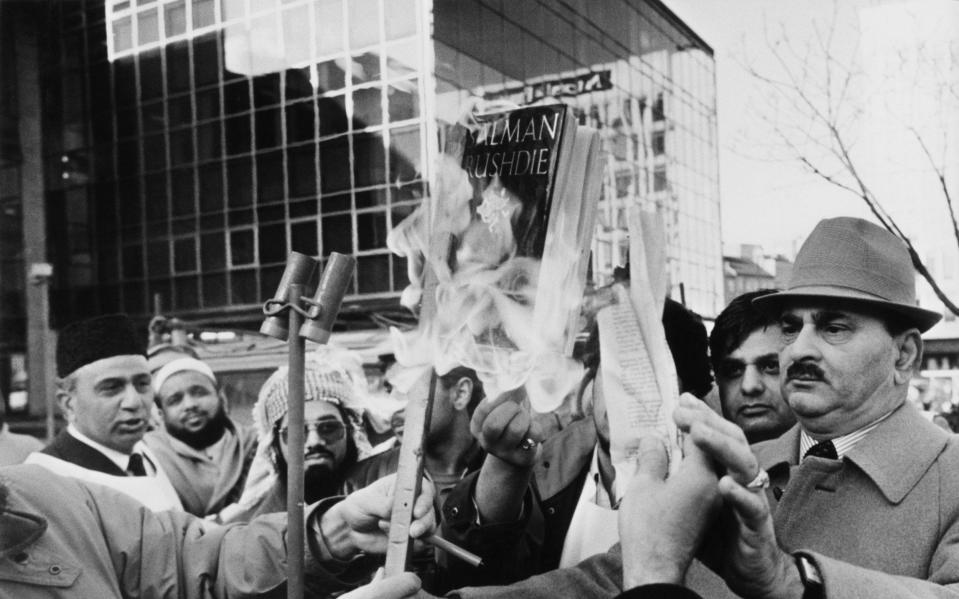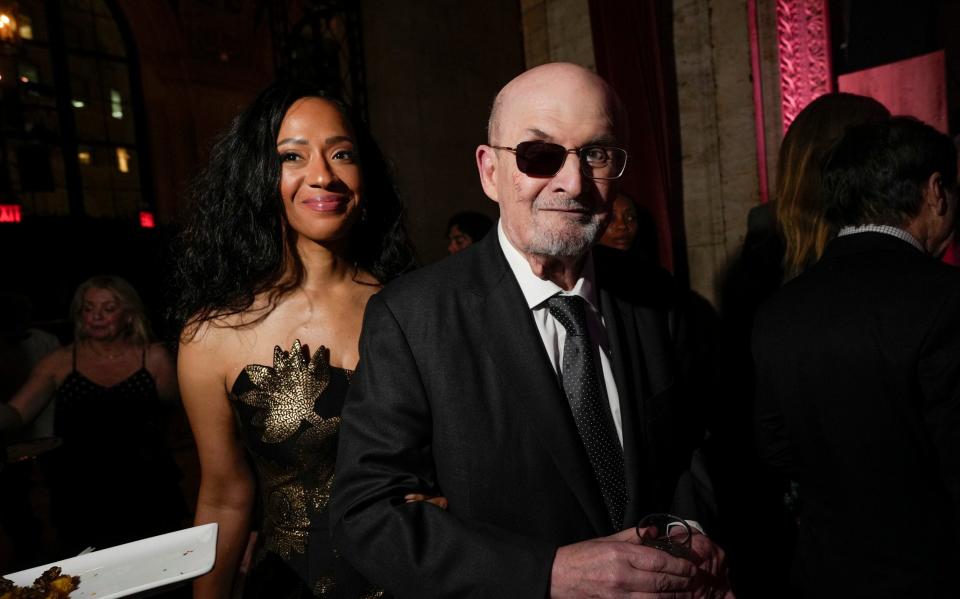Review: Salman Rushdie’s memoir is horrific, upsetting – and a masterpiece

- Oops!Something went wrong.Please try again later.
It was the summer of 2022. I’d discovered that Salman Rushdie and one of my oldest friends were members of the same private members’ club. Wouldn’t it be great, I thought to myself, if these two cool guys could meet? So, on August 9, the three of us gathered for a drink in lower Manhattan. Salman drank an old-fashioned, my friend and I had sake over ice, and we talked about being New Yorkers – as Salman is now, having moved there nearly 25 years ago, and as I’ll always consider myself, though I’ve lived for many years in London. It was such an ordinary evening, ordinary in the best possible way – just happy, just fun. Salman spoke with warmth about his life; I remember how inspired he was by his students at New York University. Lucky students, I thought, to have him for a professor.
I have known Salman for many years. Through all that time, particularly when we’ve done literary events together, I’ve sensed the presence of security: sometimes more, sometimes less. The man himself never seemed fazed, and never failed to be as brilliant a performer as he is a writer. On one occasion, an audience member asked how he coped with fame: surely he was recognised all the time? Salman laughed, and said that only once in his New York life had he been accosted: “He was an older Indian gentleman. He came beetling up to me. ‘Salman Rushdie?’ Yes, I said. He wagged his finger in my face. ‘Not as good as VS Naipaul!’” The audience roared with laughter.
That August evening in that cosy club, when the three of us finally said our goodbyes, I thought to myself – really, I did – the fatwa, the death threats… thank goodness all that’s over. Three days later, on the morning of August 12, the friend whom Salman and I had met telephoned me, and told me to turn on the news.
Eighteen days on, having survived his near-murder, Rushdie was moved from the trauma centre in Pennsylvania to a rehabilitation unit in Manhattan. His younger son, 25-year-old Milan, had flown from London to his bedside. As Rushdie relates in this extraordinary book, Milan told him that he’d been researching knife attacks. “Dad, there are so many cases where somebody gets stabbed just once and dies,” he says. “And you got stabbed like 15 times and you’re still alive.” Dad nods in acknowledgment. “You know,” he says, “the fictional character with whom I now most strongly identify is Wolverine.” The astute reader will recall that the X-Man’s skeleton is reinforced with “adamantium”, and that he’s endowed with a superheroic “healing factor” that preserves his life over and over again.
Knife: Meditations After an Attempted Murder is full of Rushdie’s wit, his wisdom, his stoicism, his optimism, his love of all culture from the so-called “high” to the so-called “low”. Across the course of his career – he has won the Booker Prize, been elected to the Royal Society of Literature, received a knighthood; Knife is his 22nd book – he has proved himself adept at describing miracles. Yet he had never lived one until the dreadful August day and all that came after.

That morning, on stage at the Chautauqua Institution in upstate New York, about to deliver his speech – about creating safe spaces for writers, as it happens – Rushdie saw the nemesis he’d thought was long behind him: a man in black, “running toward me down the right-hand side of the seating area. Black clothes, black face-mask. He was coming in hard and low, a squat missile. I got to my feet and watched him come. I was transfixed.”
For 27 seconds, the 24-year-old assailant – Rushdie never names him; he is referred to throughout as “the A” – wields his blade to appalling effect. Rushdie is stabbed in the hand and chest; his face and his throat are slashed; the optic nerve of his right eye is destroyed. Members of the audience storm the stage and help his interlocutor, Henry Reese, to subdue the attacker. Rushdie is airlifted to hospital while his wife, the poet, photographer and novelist Rachel Eliza Griffiths, rushes to be by his side.
The attack collapses time, reawakening the spectre of the “Khomeini fatwa”, as Rushdie bluntly calls it, issued in the aftermath of the publication of The Satanic Verses in 1988. Those bad times had seemed far in the past; and yet, as Rushdie reveals, the A’s sensibility is horrifyingly contemporary. The latter admits, speaking to journalists from his cell, that he has only read “like, two pages” of Rushdie’s work; he’d watched a few clips of the writer online and found him “disingenuous”.

About two-thirds of the way through Knife, Rushdie conducts his own imaginary interview with this assailant, “my would-be Assassin, the Asinine man who made Assumptions about me, and with whom I had a near-lethal Assignation” – Rushdie’s wordplay never fails him – and attempts to conceive of the young man’s motives. If the attempt is unsatisfying, it isn’t because Rushdie isn’t up to the task; the task, in a sense, isn’t up to Rushdie. A crime novel in which the motive was “I thought he was disingenuous” would never make it to a bookshelf. Rushdie wonders whether the assault was a bizarre extension of the online games the A played, hour upon hour, in his New Jersey basement. (The trial was originally set for January, but has been delayed by the publication of this memoir, because the defendant’s lawyer argued they were entitled to see it. A new date has not been set.)
Rushdie reminds the reader, with clarity but without rancour, that in 1988 there were those who implied, shockingly, that he had it coming. John Berger, Germaine Greer, Jimmy Carter, Richard Littlejohn: Rushdie names them not once, but twice. (He remembers.) But this time – and how ghastly that there should be a “this time” – the outpouring of support is immediate and generous. Love and strength are offered by his sister Sameen, his sons Milan and Zafar, and friends from across the globe. US president Joe Biden releases a statement about how Rushdie, in his work and in his person, “stands for essential, universal ideals”. “His fight is our fight – it is universal,” agrees Emmanuel Macron. (Yet Rushdie notes one silence: “India, the country of my birth and my deepest inspiration, on that day found no words.”)
Above all, Knife is a paean to one woman’s determination and fortitude. “I have always believed that love is a force,” Rushdie writes; “that in its most potent form it can move mountains. It can change the world.” One chapter of this book is called simply “Eliza”, and if its depiction of true love found late in life doesn’t bring a tear to your eye, I cannot help you. Rushdie and Griffiths met in 2017 at a literary gala in New York, and swiftly became a couple; they had been married for less than a year when the attack took place. It is almost unbearably moving when, at the end of September 2022, Rushdie is finally able to leave hospital and return home to Manhattan. “Eliza lay down on the bed next to me and then, suddenly, she was sobbing uncontrollably as all the stress poured out of her. ‘My husband’s home,’ she sobbed. ‘My husband’s home.’”

Rushdie recounts his wounds and recovery in graphic detail, a documentary record which he leavens with humour. “Dear reader, if you have never had a catheter inserted into your genital organ, do your very best to keep that record intact.” He details the weeks-long procedure necessary to save his (unseeing) right eye. “I’m not very good about pain,” he tells the doctor, before having his eyelid stitched shut for seven weeks. Another refrain: “If you can avoid having your eyelid sewn shut... avoid it. It really, really hurts.”
Throughout Knife, Rushdie also makes clear that freedom of speech – a freedom increasingly under threat from forces on both the Right and the Left – is no luxury. “Art challenges orthodoxy,” he writes. “To reject or vilify art because it does that is to fail to understand its nature. Art sets the artist’s passionate personal vision against the received ideas of the time… Without art, our ability to think, to see freshly, and to renew our world would wither and die.”
How shocking that this belief nearly cost Rushdie his life. He told his agent and old friend Andrew Wylie that he feared he would never write again. Wylie knew he would; knew he would write this book and go on to write others. “I don’t believe in miracles,” Rushdie tells us, “but my survival is miraculous. Okay, then. So be it. The reality of my books – oh, call it magic realism if you must – is now the actual reality in which I’m living. Maybe my books had been building that bridge for decades, and now the miraculous could cross it. The magic had become realism. Maybe my books saved my life.” Reader, disbelieve it if you dare.
Knife: Meditations After an Attempted Murder is published by Jonathan Cape at £20. To order your copy for £16.99, call 0808 196 6794 or call Telegraph Books. Salman Rushdie will be in conversation with Erica Wagner via livestream at the Southbank Centre on April 21. Tickets: southbankcentre.co.uk


